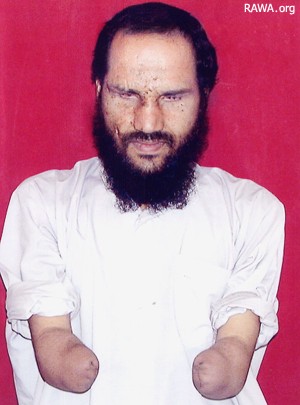By Allison Lampert
KANDAHAR - Gullalai doesn't dream of a better life for her 16-year-old son Iqbar. His growth and education have been stunted by a childhood disease that's left him unable to walk to school with his 10-year-old brother Feroz.
"There is no future for him," said Gullalai, who like many Afghans goes by one name. "He cannot work. He is half a person."
Like her son, she shares the burden of being handicapped in this war-torn country. Shrapnel from mortars fired by the Russians during the Afghan civil war cost Gullalai her right foot, while her husband was gunned down by an unknown assailant four years ago.

Afghanistan has about 800,000 people with disabilities.
She hobbled with her children Saturday to the site of Canada's Provincial Reconstruction Team at Camp Nathan Smith, a sprawling base located at the site of an old canning factory.
In preparation for the second celebration of the Muslim holiday Eid, the Canadians were handing out provisions for 450 handicapped Afghans: 50 kilogram bags of flour, two kilogram bags of sugar and three litres of cooking oil. The reconstruction team has about a thousand ongoing projects, including efforts to build bridges, roads and schools, depending on where it's safe to operate.
"We don't do this very often," said PRT commander Lt-Col. Bob Chamberlain of the food distribution. "We do it once in awhile to demonstrate that we're good neighbours. "We are targeting the handicapped in particular because they are among the most vulnerable in this society."
In Kandahar province there are 3,762 Afghans registered as disabled, said Bashir Ahmad Wali, director of the Afghan Disabled Rehabilitation Association. Wali, who was injured from stepping on a mine, said he believes there are far more handicapped Afghans in Kandahar.
"Most of them are not registered," he said.
Discrimination and the high proportion of labour intensive jobs like farming in Afghanistan make it hard for the disabled to earn a living, he said.
What's worse, Wali said, is that Afghanistan's Ministry of Martyrs and the Disabled is failing to support the country's handicapped population because of corruption and heavy bureaucracy.
"The government does not take our problems seriously," he said.

There are 100,000 children disabled in Afghanistan.
Each disabled Afghan is supposed to get $8 US a month from the government, but these monthly stipends are not paid regularly.
The handicapped have difficulty receiving their money because they must travel to the government offices, which are only located in the big cities, said Fayaz Ullah, a civil servant with the ministry. In addition, as they lack a computer network, Afghan civil servants must still do all the processing of financial aid by hand, which can take days.
"There are huge problems to deal with," Ullah said.
"If we could have more bureaus built in the rural districts then these problems would largely be fixed."
Although Gullalai said she does receive her stipend, the money is insufficient. Even the money she earns as a seamstress isn't enough to pay for a home for herself and her four children.
Gullalai bursts into tears as she recounts how the family shares a bombed out mud home with her stepson and his family. There are nine children and three adults living in the remaining four rooms.
"As a widow and as a handicapped woman, it's very, very hard for me," she said. "What we really need is our own home."
The family is taking comfort in celebrating the Eid holiday, which starts this week. As a treat, they will celebrate by eating special cakes. Gullalai's son Feroz has other ideas.
He wants to ask his late father's uncle for $4. That's all he needs to buy new sandals and new clothes to replace his faded shalvar-kameez.



